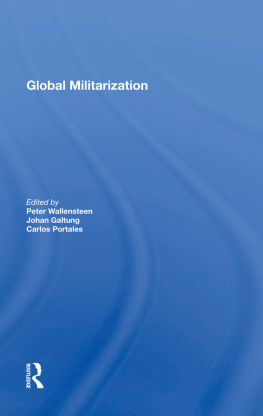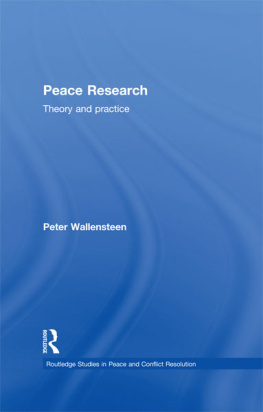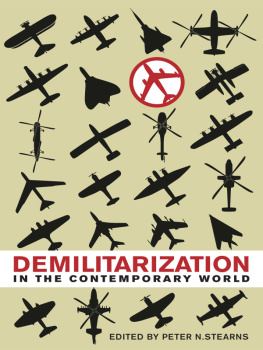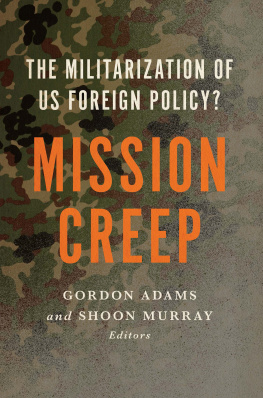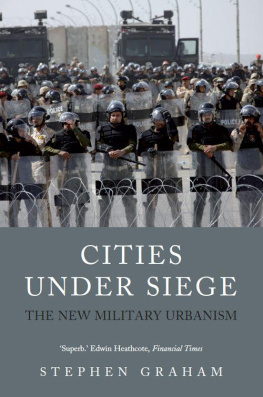Global Militarization
Also of Interest
Culture, Ideology, and World Order, edited by R.B.J. Walker
The Quest for a Just World Order, Samuel S. Kim
The War System: An Interdisciplinary Approach, edited by Richard A. Falk and Samuel S. Kim
Toward Nuclear Disarmament and Global Security: A Search for Alternatives, edited by Burns H. Weston
The Nuclear Freeze Debate: Arms Control Issues for the 1980s, edited by Paul M. Cole and William J. Taylor, Jr.
Nuclear Proliferation in Developing Countries, edited by Jae Kyu Park
Nuclear War and, the American Churches: Ethical Positions on Modern Warfare, Donald L. Davidson
Military Strategy in Transition: Defense and Deterrence in the 1980s, edited by Keith A. Dunn and William O. Staudenmaier
Thinking About National Security: Defense and Foreign Policy in a Dangerous World, Harold Brown
The Defense of the West: Strategic and European Security Issues Reappraised, edited by Robert Kennedy and John M. Weinstein
National Security in the Third, World , Abdul-Monem Al-Mashat
Arms Control and International Security, edited by Roman Kolkowicz and Neil Joeck
National Security and Technology Transfer: The Strategic Dimensions of East-West Trade, edited by Gary K. Bertsch and John R. Mclntyre
Managing U.S.-Soviet Rivalry: Problems of Crisis Prevention, Alexander George with Coit D. Blacker, Barry M. Blechman, George W. Breslaver, Gloria Duffy, Paul Gordon Lauren, Larry C. Napper, Janne E. Nolan, Alan Platt, and I. William Zartman
Military Power and the Advance of Technology: General Purpose Military Forces for the 1980s and Beyond, Seymour J. Deitchman
Available in hardcover and paperback.
Westview Special Studies in Peace, Conflict, and Conflict Resolution
Global Militarization
edited by Peter Wallensteen, Johan Galtung, and Carlos Portales
Repression, armed conflicts, interstate wars, the international arms trade, military regimes, and increasing worldwide military expenditures are all indications of one particularly significant development in world politics: global militarization. In this volume, an international group of scholars describe, explain, and evaluate the roots of this development and suggest ways out of the increasing spiral of militarization.
The authors first explore the historical, sociological, organizational, and political origins of the many-faceted phenomenon of global militarization, placing particular emphasis on the role of the state. Then, in a series of case studies, they investigate the militarization of internal politics in Third World countries and analyze, in contrast, theoretically plausible and empirically attempted alternatives to an otherwise gloomy future. Professor Galtung provides a discussion outlining possible trends for the present decade.
Dr. Peter Wallensteen is associate professor of peace research at Uppsala University in Sweden. He served as a visiting professor in the Department of Political Science at the University of Michigan in 1984 and is the author of Dilemmas of Economic Coercion: Sanctions in World Politics (1983). Dr. Johan Galtung is professor of peace and conflict research at the Science Center in Berlin. He is the author of Essays in Peace Research , Volumes 1-5 (1975-1980) and was the founder of the Journal of Peace Research. Dr. Carlos Portales is a researcher at FLACSO in Santiago, Chile, and teaches part time in the M.A. program of the Institute of International Studies of the University of Chile.
First published 1985 by Westview Press
Published 2019 by Routledge
52 Vanderbilt Avenue, New York, NY 10017
2 Park Square, Milton Park, Abingdon, Oxon OX14 4RN
Routledge is an imprint of the Taylor & Francis Group, an informa business
Copyright 1985 by Taylor & Francis
All rights reserved. No part of this book may be reprinted or reproduced or utilised in any form or by any electronic, mechanical, or other means, now known or hereafter invented, including photocopying and recording, or in any information storage or retrieval system, without permission in writing from the publishers.
Notice:
Product or corporate names may be trademarks or registered trademarks, and are used only for identification and explanation without intent to infringe.
Library of Congress Cataloging in Publication Data
Main entry under title:
Global militarization.
(Westview special studies in peace, conflict, and
conflict resolution)
Includes index.
1. Sociology, MilitaryAddresses, essays, lectures.
2. MilitarismAddresses, essays, lectures.
I. Wallensteen, Peter, 1945- . II. Galtung, Johan.
III. Portales, Carlos. IV. Series.
U21.5.G57 1985 355'.0213 84-13186
ISBN 13: 978-0-367-01483-4 (hbk)
Militarization and Civilian Society
Ours is the age of militarization. Ours is also the age of questioning militarization. In the long history of human society, military attitudes, military behavior, and military structures have never been as widely represented as they are today. The war machines controlled by the United States and the Soviet Union have no historical comparison. The most devastating wars ever fought have occurred during this century, and several of them belong to the so-called postwar period, i.e., post 1945. The proliferation of arms trade, arms production, and military regimes makes the phenomenon of militarization a global one. It has many faces and shifting forms, but in toto, it limits the scope for civilian development. The parallel to a cancerous growth in a body is drawn by many.
At the same time, ours is an age of questioning militarization. The nineteenth century saw a growth of nonmilitary institutions that was also unprecedented in history: economic corporations, trade unions, political parties, cooperative movements, peace organizations, religious associations, to name only a few. Many of these civilian organizations explicitly questioned the role of the state, particularly its roots in military organization and dynastic control. Others, by their mere existence, showed that there were alternative forms of organization to the state and the armed forces.
Thus, we find ourselves in an era of rising militarization but also in an era when this trend is questioned more than before. The purpose of this book is to analyze the militarization trend and to suggest ways in which it can be changed. Thus, this volume seeks to understand what is going on and searches for alternatives. It will certainly not be the final work on this topic, but the authors hope it will contribute to the necessary process of questioning. The urgency of the topic cannot be denied. The qualitatively new turns of the arms race make military alternatives more likely in confrontations between superpowers, the influence of military institutions and attitudes shift resources away from badly needed civilian development, and the control of government by military regimes results in repression and continued violence.


